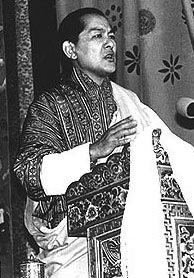 |
Bhutan Politics |
|
|
 |
|
Male
Wood Monkey Year: National Agenda 2004
|
 |
 |
| The
political reformation process initiated by His Majesty the King is expected
to continue in the Male Wood Monkey year.
Bhutan
expects to resume talks with Nepal on the problem of the people in camps
in eastern Nepal and make significant progress according to the prime minister,
Lyonpo Jigme Thinley.
The
prime minister also said that socio-economic development should gather
momentum in 2004 particularly in the absence of the militants who had cast
a shadow on effective development in the southern part of the country.
The trade and industry minister, Lyonpo Yeshey Zimba, will take over as
the new head of government and prime minister in August.
The
proceedings of the National Assembly are expected to become more streamlined
with the adoption of the Rule of Procedure of conduct. According to the
National Assembly secretariat, the Rule of Procedure will ensure that the
discussions do not deviate from the submitted agenda. |
|
The
Assembly will also elect new royal advisory councillors in the coming session
of the National Assembly.
Among
other issues, the reduction of the personal income tax (PIT) discussed
in the last session will be resubmitted.
The
Assembly will also look at the bifurcation of the National Assembly and
the National Election Commission.
As
our country progresses on the path of socio-economic development, it is
important to provide gainful employment to our people.
| DEVELOPMENT |
 |
With
only 10 percent of the 16 percent outlay activities carried out by the
dzongkhags by the end of the first year of the Ninth Plan, there is much
catching up to do in the Male Wood Monkey year according to the preliminary
reports submitted to the department of planning.
A
Planning Commission official explained that the activities were delayed
because funds had not been finalised with development partners.
With
the Ninth plan in the second half of its second year the government is
upbeat about carrying out the planned activities with an enhanced assistance
package for the Ninth Plan finalised during His Majesty's visit to India
in September last year.
Among
the planned activities one priority is to build the gups' offices which
had been held back in the first year and the construction of rural farm
roads, according to the department. The government aims to construct 560
kilometres of farm roads nation wide and an office each for the gups of
the 201 geogs.
The
department has two main worries: finishing the activities that could not
be carried out in the first year of the Plan and the extremely weak capacity
of the geogs to carry out the slated activities. That is why all the geogs
are expected to work closely with the dzongkhags' technical units.
It
is most likely that Paro, Gedu, Chukha, and Phuentsholing will be able
to receive Bhutan broadcasting service (BBS) television live in the latter
part of the year with the laying of the 110-kilometre OPGW (Optical groundwire)
fibre network covering Paro, Chukha and Thimphu. The fibre network, which
is being laid by Bhutan Telecom and the Bhutan Power Corporation through
the existing overhead power transmission system as an alternate route to
the existing digital microwave will also carry BBS TV signals.
The
construction of two new hospitals in Phuentsholing and Dagana and a public
health laboratory in Thimphu will be undertaken in the coming year. The
ongoing government of India assisted project to expand the Jigme Dorji
Wangchuck National Referral Hospital and the Mongar Referral Hospital will
be intensified to complete the project by the end of the Plan period.
Considering
the work at hand the Bhutan Power Corporation expects to electrify more
than 600 households in the coming year under the ACB phase II project and
royal government financing in Zhemgang , Trashigang, Pemagatsel Paro, Chukha,
and Trashigang.
| ECONOMY |
 |
According
to the Ninth Plan the economy is targeted to grow by 8.1 percent in 2004
but this target may not be achieved because of the global economy, according
to the National Statistical Bureau. The NSB estimates that Bhutan may be
able to achieve a growth rate of 6 -7 percent in the Wood Monkey year.
Tourism and related service industries, projected to grow by 15 percent,
will influence growth. Air transport in particular, with the buying of
two new high capacity planes, will also boost the growth of the tourism
sector.
The
construction sector will continue to be the most buoyant sector fueled
mainly by the on-going 1020 MW Tala hydroelectric project. The NSB expects
a boom in private housing boosted by the national pension and provident
fund housing loan scheme.
According
to the trade ministry several new industries will come up in the coming
year with the allocation of land in the Pasakha industrial estate finalised.
The ministry will also operationalise the Foreign Direct Investment Policy
which has so far remained on paper. This means that more applications for
FDI will be welcome and decisions will be made on applications that have
been received.
The
process of negotiations in the process of accession to the World Trade
Organisation (WTO) is also expected to start this year with the memorandum
of the foreign trade regime (MFTR) submitted in February, 2003. The MFTR
is a comprehensive document of the financial, economic and trade policies
of the country which will form the basis of discussions for WTO membership.
| This
article was contributed by KUENSEL, Bhutan's National Newspaper 2003 |
 |
| more
information |
 |
|


